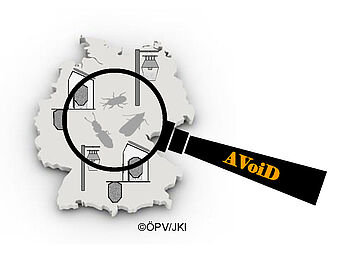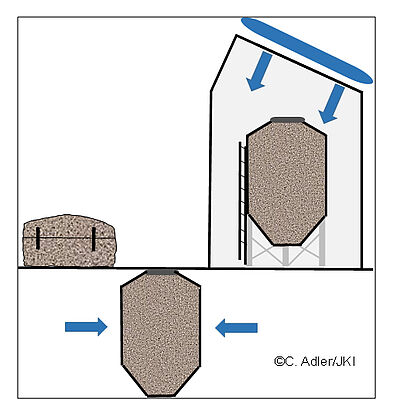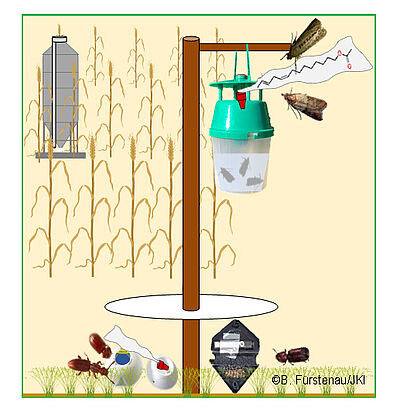Inhalt: Project details
Duration
10.2022 – 11.2025
Contact persons
- Dr. Cornel Adler (ÖPV)
Tel: +49 (0)30 8304 2502
cornel.adler@julius-kuehn.de
- Dr. Benjamin Fürstenau (ÖPV)
Tel: +49 (0)30 8304 2080
benjamin.fuerstenau@julius-kuehn.de
JKI Project team
Institute for Ecological
Chemistry, Plant Analysis and Stored Product Protection (ÖPV)
Institute for Strategies and
Technology Assessment (SF)
The project "AVoiD" is funded by the Federal Ministry of Food and Agriculture as part of the German Climate Protection Programme 2022.
AVoiD is a collaboration project with the Johann Heinrich von Thünen Institute and Max Rubner-Institut.
Inhalt: Preventing stored product pests in Germany (AVoiD)
Background:
Due to higher mean annual temperatures caused by climate change, developmental conditions for stored product arthropods are shifting closer towards the optimum. As in tropical climates, infestation with stored product pests occurs more frequently already in the field. However, there is little data available in Germany on the occurrence and geographical distribution of stored product pests in the field and in storage. The lack of this information prevents an early response. In addition to thorough cleaning and drying of the harvested crop, gas-tight (hermetic) storage can prevent stored product pests from entering from the outside via odour-orientation. In conventional outdoor silos, the quality of stored grain crops suffers from day-night temperature and humidity fluctuations, and insects can enter the product through leaky joints and vents. In a gas-tight enclosure, an oxygen-free atmosphere develops in the product by respiration of atmospheric oxygen, which maintains grain quality and germination, but suppresses harmful arthropods and fungi.
Objectives:
- ClimateOptiStorage: We investigate how best to achieve the benefits of historically widespread underground hermetic storage (passive cooling, no temperature fluctuations, pest proofing, oxygen deprivation, and preservation of product quality). From a structural, food and occupational safety, gas-tightness, sustainability and cost-efficiency perspective, optimized underground or above-ground storage structures will be tested.
- Monitoring : We analyse the occurrence of pests and the influence of regional differences on their distribution over time. Special attention is paid to investigating the occurrence of new pest species in order to initiate countermeasures if necessary. The aim is to develop an optimized early detection of stored product insects inside and especially outside of storage facilities. To this end, various monitoring systems (attractants and traps) are tested at selected locations in Germany as well as under laboratory conditions.



